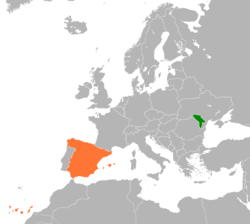
After achieving independence from the Soviet Union, the Republic of Moldova established relations with other European countries. A course for European Union integration and neutrality define the country's foreign policy guidelines.

Petru Lucinschi is a former Moldovan politician who was Moldova's second President from 1997 to 2001. He currently serves as the founder and head of the Lucinschi Foundation of Strategic Studies and International Relations.
The 1997 Moscow memorandum, also known as the Primakov memorandum, was an agreement governing relations between Moldova and Transnistria aimed at solving the Transnistria conflict.

Modern Moldova-Romania relations emerged after the Republic of Moldova gained independence from the Soviet Union in 1991. Pan-Romanianism has been a consistent part of Moldovan politics, and was adopted in the Popular Front of Moldova's platform in 1992. The official language of Moldova is Romanian. The peoples of the two countries share common traditions and folklore, including a common name for the monetary unit – the leu. At present, relations between the two states are exceptionally friendly, especially on account of the pro-Romanian administration of Maia Sandu in Moldova.

Moldova–Russia relations are the bilateral relations between the Republic of Moldova and the Russian Federation, two Eastern European, post-Soviet, ex-communist countries. Russian support for the self-proclaimed Pridnestrovian Moldavian Republic (Transnistria) and a substantial Russian military presence therein strained Moldovan relations with Russia.
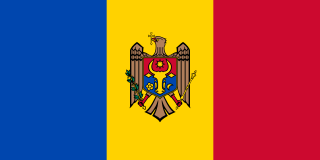
The following outline is provided as an overview of and topical guide to Moldova:

Moldova–Ukraine relations are the bilateral/diplomatic/foreign relations between the sovereign states of Moldova and Ukraine. The Moldova–Ukraine border is 985 kilometers. Ukrainians are the third largest ethnic group in Moldova, behind Moldovans and Romanians. Both countries were former republics of the Soviet Union and are also the poorest countries in Europe. Both countries have applied for membership to join the European Union in 2022.
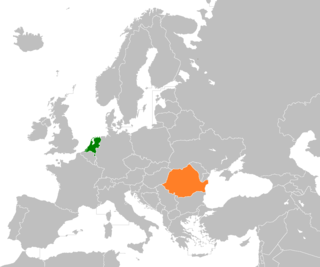
Netherlands–Romania relations are the bilateral relations between the Netherlands and Romania. The Ambassador to Romania is concurrently accredited to Moldova. Romania has an embassy in The Hague and honorary consulates in Heeg, Rotterdam and Venlo. The Netherlands has an embassy in Bucharest, honorary consulates in Cluj-Napoca, Timișoara and Constanța, and since 2016 an office in Chișinău in Moldova.

Austria-Moldova relations are the bilateral relations between Austria and Moldova. Both countries established the diplomatic relations on 25 March 1992. Austria is represented in Moldova through its embassy in Chișinău. Moldova has an embassy in Vienna. Austria supports Moldova's European Union membership.

Moldova–Switzerland relations are the bilateral relations between Moldova and Switzerland. Both countries established diplomatic relations on September 2, 1992. Moldova is represented in Switzerland through its embassy to the United Nations in Geneva. Switzerland is represented in Moldova through its embassy in Kyiv (Ukraine) and an honorary consulate in Chişinău. Since 1992 various senior Moldovan officials have visited Switzerland to discuss improvements in bilateral relations. Switzerland has provided significant aid to Moldova. Both nations are members of the Council of Europe.
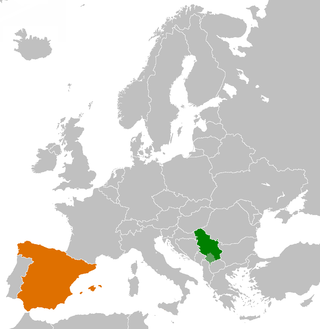
Serbia-Spain relations are foreign relations between Serbia and Spain. Both countries established diplomatic relations on October 14, 1916. Serbia has an embassy in Madrid. Spain has an embassy in Belgrade. Both countries are member states of the UN, Interpol, COE and OSCE. Spain is member state of the EU since 1986 and Serbia is a candidate country since 2012 negotiating its future membership which Spain is strongly supporting. In relation to third parties, both countries supported position of Argentina in its Falkland Islands sovereignty dispute with the United Kingdom in the past.

Moldova–Slovenia relations are the bilateral relations between Moldova and Slovenia. Moldova recognized the Republic of Slovenia under an unknown date. Diplomatic relations were established on October 27, 1993. Both countries are represented in each other through their embassies in Budapest (Hungary). Slovenia is a member of the European Union, which Moldova applied for in 2022. Both countries are full members of the Council of Europe.
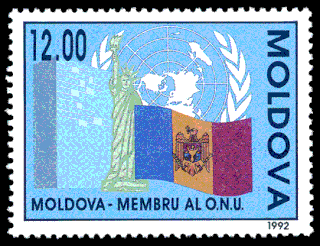
The following is timeline of the History of independent Moldova which started after the independence of Moldova.
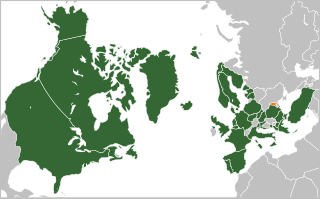
Official relations between Moldova and NATO began in 1992 when Moldova joined the North Atlantic Cooperation Council. However, as Moldova's neutrality is enshrined in its constitution, there are no official plans for Moldova to join the organization.

Denmark – Moldova relations refers to the current and historical relations between Denmark and Moldova. Neither country has a resident ambassador. The Moldovan Ambassador to Denmark is Igor Corman, who resides in Berlin and was appointed in 2005. The Danish Ambassador in Moldova is Ole Harald Lisborg, who resides in Bucharest. Denmark is a member of the European Union, which Moldova applied for in 2022. Both countries are full members of Council of Europe.

Moldova–Poland relations refers to the relationship between Moldova and Poland. The two countries established relations following the independence of Moldova at 1991. Poland is a member of the European Union, which Moldova applied for in 2022. Both countries are full members of the Council of Europe. Also Moldova is an EU candidate and Poland is an EU member.

Moldova–Transnistria relations are the political and economic relations between the Republic of Moldova and Transnistria, an unrecognized state between the Dniester River and Ukraine. During the dissolution of the Soviet Union, political tensions in the Moldavian Soviet Socialist Republic led to Transnistria declaring independence from Moldova, culminating in the Transnistrian War of 1992. As part of the ceasefire agreement ending the war, a Joint Control Commission composed of Moldovan, Transnistrian, and Russian forces was established to supervise the demilitarized zone which was located in the Transnistrian region. The Joint Control Commission still supervises the zone, and negotiations to resolve the dispute are ongoing. The negotiations are supported by the Russian Federation, Ukraine, the United States, the European Union, and the Organization for Security and Co-operation in Europe (OSCE).

North Macedonia–Spain relations are the bilateral and diplomatic relations between these two countries. North Macedonia has an embassy in Madrid and three consulates in Barcelona, Madrid and Valencia. Spain has an embassy in Skopje. Both countries are members of the Council of Europe, and NATO. Also North Macedonia is an EU candidate and Spain is an EU member.

South Korea–Spain relations are the bilateral and diplomatic relations between these two countries. Spain has an embassy in Seoul. South Korea has an embassy in Madrid and a consulate general in Barcelona and Las Palmas de Gran Canaria. The bilateral relations are good and friendly.

Guinea–Spain relations are the bilateral and diplomatic relations between these two countries. Guinea has an embassy in Madrid and honorary consulate in Barcelona, Las Palmas de Gran Canaria and Valencia. Spain has an embassy in Conakry.
